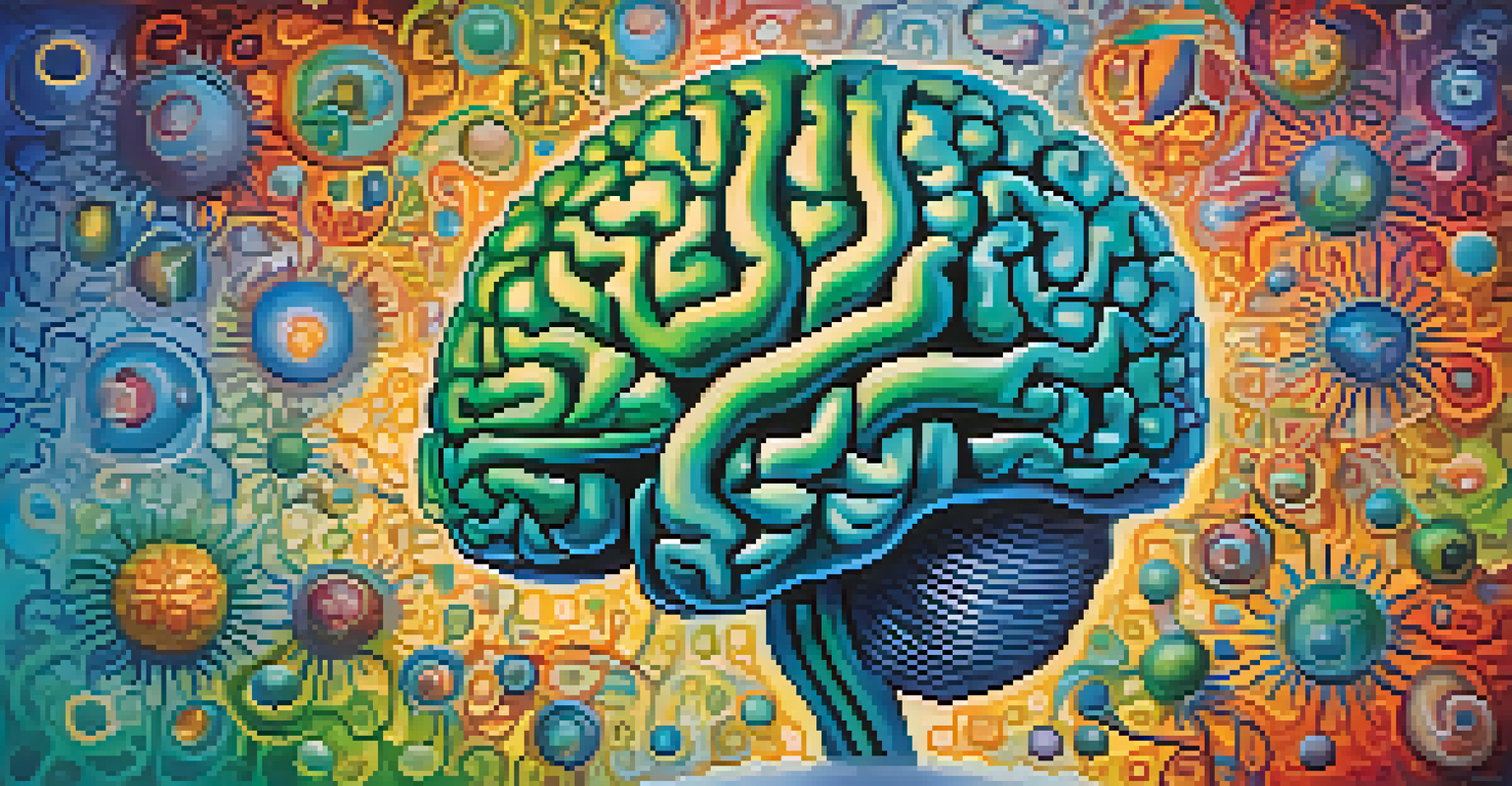The Science of Addiction: Neuroplasticity's Role in Recovery

What is Addiction? Defining the Challenge
Addiction is often seen as a chronic disease that affects the brain's structure and function. It involves compulsive behaviors and a lack of control over substance use despite negative consequences. This condition can stem from various factors, including genetics, environment, and mental health issues, making it a multifaceted challenge.
Addiction is a symptom of not being able to manage your life, and it manifests in many ways.
Understanding addiction requires looking beyond just the behavior. It’s about how substances alter the brain's reward system, leading to cravings and dependency. This complexity makes recovery a difficult journey that requires more than just willpower; it demands a deep understanding of the brain's functioning.
As we delve into the science behind addiction, we’ll uncover how neuroplasticity—the brain's ability to reorganize itself—plays a crucial role in recovery. This fascinating aspect of neuroscience offers hope and strategies for those seeking to break free from the grips of addiction.
Neuroplasticity: The Brain's Remarkable Adaptability
Neuroplasticity is the brain's ability to change and adapt throughout an individual's life. This ability allows the brain to rewire itself in response to learning, experience, and injury. In the context of addiction, neuroplasticity can be both a foe and a friend—reinforcing negative behaviors while also offering pathways to recovery.

For example, when someone repeatedly engages in addictive behaviors, their brain forms new neural pathways that prioritize those actions. However, these pathways can also be reshaped, giving hope to those in recovery. By engaging in new, healthy habits, individuals can effectively 'retrain' their brains.
Understanding Addiction's Complexity
Addiction is a chronic disease influenced by various factors, including genetics and brain function, making recovery a multifaceted challenge.
This adaptability is crucial in recovery, as it means that change is always possible. With the right support and strategies, individuals can foster positive changes in their brain’s wiring, paving the way for a healthier, addiction-free life.
The Brain's Reward System and Addiction
The brain's reward system is a complex network that plays a key role in addiction. It involves several areas of the brain, including the nucleus accumbens and the prefrontal cortex, which are responsible for feelings of pleasure and decision-making. When substances like drugs or alcohol are consumed, they trigger a flood of dopamine, reinforcing the behavior.
The brain is capable of change, and neuroplasticity opens up new pathways to healing.
This pleasurable response can create a cycle where the brain begins to associate the substance with reward, making it increasingly difficult for individuals to resist cravings. Understanding this cycle is essential for developing effective recovery strategies, as it highlights the challenges of breaking free from addiction.
By leveraging neuroplasticity, individuals can work to disrupt this cycle. Engaging in activities that naturally boost dopamine levels—like exercise or creative pursuits—can help rewire the brain's reward system, making it easier to establish healthier habits.
Strategies for Harnessing Neuroplasticity in Recovery
To effectively harness neuroplasticity in recovery, individuals can adopt various strategies that promote positive brain changes. Mindfulness practices, such as meditation, can enhance self-awareness and reduce stress, which is often a trigger for relapse. By incorporating mindfulness into their routine, individuals can learn to manage cravings more effectively.
Additionally, cognitive-behavioral therapy (CBT) is a powerful tool in addiction recovery. It helps individuals identify and challenge negative thought patterns, fostering healthier ways of thinking and behaving. This therapeutic approach encourages neuroplasticity by creating new, positive neural pathways.
Neuroplasticity Supports Recovery
The brain's ability to adapt, known as neuroplasticity, allows individuals to reshape their neural pathways and foster healthier behaviors during recovery.
Moreover, establishing a strong support system is invaluable. Surrounding oneself with understanding friends or participating in support groups can significantly impact recovery outcomes. This social aspect not only provides accountability but also reinforces positive behaviors through shared experiences.
The Role of Lifestyle Changes in Recovery
Making lifestyle changes is a vital component of utilizing neuroplasticity in addiction recovery. Simple adjustments, such as adopting a balanced diet and regular exercise, can significantly impact brain health. Nutrition provides essential nutrients that support brain function, while physical activity increases the production of brain-derived neurotrophic factor (BDNF), which promotes neuroplasticity.
Sleep is another critical factor often overlooked in recovery. Quality sleep helps the brain consolidate new learning and repair itself after the stress of addiction. By prioritizing sleep hygiene, individuals can enhance their overall well-being and facilitate the recovery process.
Incorporating these lifestyle changes fosters an environment ripe for healing. As individuals begin to feel better physically, it can create a positive feedback loop that encourages continued engagement in healthy behaviors, ultimately strengthening their recovery journey.
The Importance of Relapse Prevention Strategies
Relapse is often considered a part of the recovery process rather than a failure. Understanding this can help individuals approach their journey with compassion and resilience. Neuroplasticity plays a significant role here, as individuals can learn from relapses and use that knowledge to fortify their recovery strategies.
Effective relapse prevention strategies include recognizing triggers, developing coping mechanisms, and creating an action plan for high-risk situations. By identifying specific scenarios that may lead to cravings, individuals can prepare themselves to respond differently, reinforcing positive neural pathways.
Lifestyle Changes Enhance Healing
Implementing lifestyle changes, such as a balanced diet and regular exercise, plays a crucial role in supporting brain health and recovery from addiction.
Additionally, ongoing therapy and support groups can provide a safety net during tough times. Staying connected with others who understand the challenges of addiction can help reduce feelings of isolation and promote accountability, which is crucial for long-term recovery.
Hope and Healing: The Future of Addiction Recovery
The journey of recovery from addiction is often long and fraught with challenges, but understanding neuroplasticity offers hope. Research continues to uncover the brain's remarkable ability to heal and adapt, providing new insights into effective treatment methods. As our knowledge expands, so too do the tools available for those seeking recovery.
Innovative therapies, such as neurofeedback and mindfulness-based approaches, are emerging as promising options for individuals struggling with addiction. These methods not only address the symptoms of addiction but also target the underlying neurological changes that occur in the brain.

Ultimately, the science of addiction and neuroplasticity reminds us that change is possible. With dedication, support, and a willingness to embrace new habits, individuals can reclaim their lives and create a brighter future free from addiction.